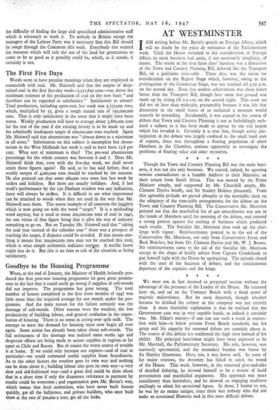AT WESTMINSTER
y AM writing before Mr..Bevin's speech on Foreign Affairs, which I will no doubt be the piece de resistance of the Parliamentary week. Until the House switched to the consideration of Foreign Affairs its main business had unity, if not necessarily simplicity, of theme. The whole of the first three days' business was a discussion of the Town and Country Planning Bill, debated like the Transport Bill, on a guillotine time-table. Three days was the ration for consideration on the Report Stage which, however, owing to the prolongation of the Committae Stage, was not reached till 5.ro p.m. on the second day. Even this modest achievement was three hours better than the Transport Bill, though here some lost ground was made up by sitting till 2.0 a.m, on the second night. This week we did not sit later than midnight, presumably because it was felt that discussion in the small hours of so technical a measure would scarcely be rewarding. Incidentally, it was argued in the course of debate that Town and Country Planning is not as forbiddingly tech- nical a subject as it has been made to appear by the vile jargon which has invaded it. Certainly it is true that, though active par- ticipation in the debate was largely confined to the small hard core of experts, there was throughout a floating population of other Members in the Chamber, anxious apparently to investigate the problems of floating value and other mysteries.
* * * * Though the Town and Country Planning Bill was the main busi- ness, it was riot the only business. We started, indeed, by agreeing nemine contradicente to a humble Address to their Majesties on their return from South Africa. This was moved by the Prime Minister simply, and supported by Mr. Churchill amply, Mr. Clement Davies briefly, and Sir Stanley Holmes pleasantly. From this agreeable prelude we passed abruptly to the inevitable clash on the adequacy of the time-table arrangements for the debate on the Town and Country Planning Bill. The Conservative Mr. Morrison pointed out that the marshalled list of 400 amendments was not in the hands of Members until the morning of the debate, and entered a strong protest against the rushing of business which produced such results. The Socialist Mr. Morrison then took up the chal- lenge with vigour. Reinforcements poured in to the aid of the Conservative Mr. Morrison, not only from Conservative Front and Back Benches, but from Mr. Clement Davies and Mr. W. J. Brown. No reinforcements came to the aid of the Socialist Mr. Morrison except in the shape of kindly advice from Captain Crookshank to put himself right with the House by apologising. The episode closed with the start of the business of debate, and the simultaneous departure of the captains and the kings.
* * * * We were not in fact doomed to perpetual session without the advantage of the presence of the Leader of the House. He returned later on, and sat on the Treasury Bench with a fixed scowl of majestic malevolence. But he soon departed, though whether because he disliked the subject or the company was not entirely clear. A more charitable explanation is that he realised that the Government case was in very capable hands, as indeed it certainly was. Mr. Silkin's oratory—if one can use such a word in connec- tion with him—is below present Front Bench standards, but his grasp and his capacity for reasoned debate are certainly above it. The course of this debate has confirmed the high view formed of his ability. His principal henchman might have been expected to be Mr. Marshall, the Parliamentary Secretary. His role, however, was curiously spectatorial, and the secondary burden was borne by Sir Hartley Shawcross. Here, too, it was borne well. In some of his major orations, the Attorney has failed to catch the mood of the House. This week, however, in the reasoned give-and-take of detailed debating, he showed himself to be a master of lucid presentation and marshalled arguments. His approach was more conciliatory than heretofore, and he showed an engaging readiness smilingly to admit his occasional lapses. In these, I hasten to say, he was by no means unique, since there was nobody who did not make an occasional Homeric nod in this most difficult debate.


































 Previous page
Previous page